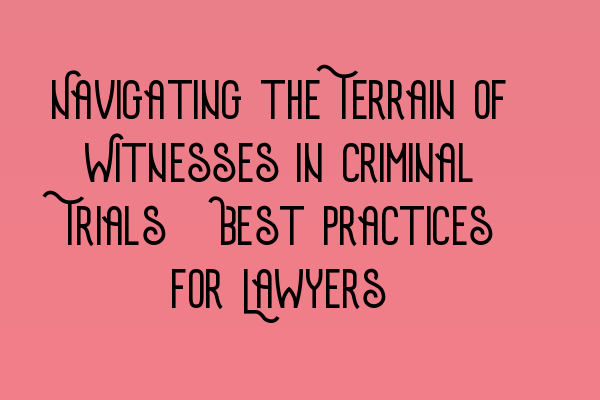Navigating the Terrain of Witnesses in Criminal Trials: Best Practices for Lawyers
Welcome to SQE Criminal Law & Practice Law UK, where we provide comprehensive resources and expert advice to aspiring solicitors. In this blog post, we will dive into the important topic of witnesses in criminal trials and provide lawyers with best practices to effectively navigate this terrain. Before we begin, make sure to check out our related articles for additional valuable insights:
- SQE Exam Prep: Essential Study Materials for Aspiring Solicitors
- Demystifying the Solicitors Qualifying Examination Format
- SQE Exam for International Lawyers: Challenges and Success Strategies
- LLC Formation Made Simple: Step-by-Step Guide for UK Entrepreneurs
- LLC Formation: A Step-by-Step Guide for UK Entrepreneurs
Importance of Witness Testimony in Criminal Trials
Witnesses play a crucial role in criminal trials, as their testimonies provide the court with first-hand accounts of the events in question. Their credibility and reliability are often key factors in determining the outcome of a case. As a lawyer, it is essential to handle witnesses effectively and ensure their testimony supports your client’s position.
Best Practices for Lawyers in Managing Witnesses
1. Thorough Preparation: Before trial, thoroughly review police reports, statements, and any other relevant documentation related to the witnesses. Identify any inconsistencies or discrepancies that can be raised during cross-examination. This will enable you to craft effective questions to challenge the witnesses’ credibility.
2. Establish Rapport: Building a rapport with witnesses is essential to gain their trust and cooperation. Take the time to genuinely listen to their concerns, address any fears or anxieties they may have, and explain the importance of their role in the trial. This will help witnesses feel more comfortable and confident when testifying.
3. Conduct Mock Examinations: Mock examinations allow you to practice questioning witnesses and refine your approach. It also helps identify potential weaknesses in your case or gaps in the witnesses’ testimony. Utilize the knowledge gained from these sessions to strengthen your examination and prepare for potential challenges in court.
4. Effective Direct Examination: During direct examination, carefully guide the witnesses to provide clear and concise answers that support your client’s case. Maintain control over the questioning, avoiding leading questions that may undermine the witness’s credibility. Ensure your questions are tailored to elicit the necessary information without overwhelming or confusing the witness.
5. Skillful Cross-Examination: Cross-examination is an opportunity to challenge the credibility and reliability of the witnesses. Craft strategic questions that expose inconsistencies, biases, or motivations that may weaken their testimony. Keep your cross-examination focused, concise, and objective, aiming to highlight any doubts or contradictions in the witness’s statements.
6. Adapting to Different Witness Personalities: Witnesses come from various backgrounds and have different personalities. Effective lawyers adapt their questioning style to suit each witness. Some witnesses may require a compassionate approach, while others respond better to assertive questioning. Understanding how to connect with different personalities will enhance your ability to elicit accurate and persuasive testimonies.
7. Maintaining Professionalism: It is crucial to maintain a professional demeanor when dealing with witnesses, regardless of their behavior or attitude. Stay calm, respectful, and focused on the case at hand. Avoid personal attacks or aggressive tactics that may alienate the witness or reflect negatively on your representation.
Conclusion
Navigating the terrain of witnesses in criminal trials requires a combination of careful preparation, effective communication, and skillful examination techniques. By following the best practices outlined above, lawyers can maximize the impact of witness testimonies and improve their chances of achieving favorable outcomes for their clients.
For more valuable resources and insights on criminal law and practice, explore our related articles:
- SQE Exam Prep: Essential Study Materials for Aspiring Solicitors
- Demystifying the Solicitors Qualifying Examination Format
- SQE Exam for International Lawyers: Challenges and Success Strategies
- LLC Formation Made Simple: Step-by-Step Guide for UK Entrepreneurs
- LLC Formation: A Step-by-Step Guide for UK Entrepreneurs
